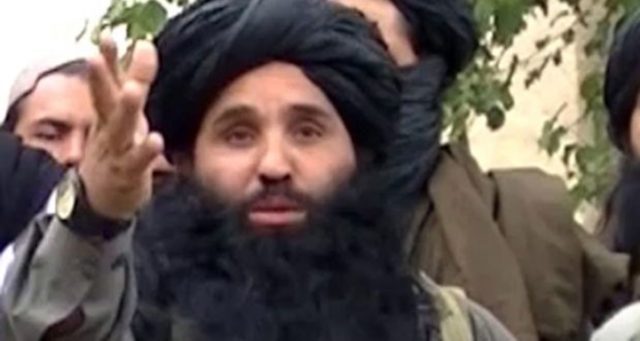The Pakistani Taliban named former deputy leader Mufti Noor Wali Mehsud as the new chief in a statement released on Saturday. The leadership change occurred a week after a United States drone strike killed the terror regime’s previous leader.
Muhammad Khurasnai, a spokesman for the terrorist group, said in the statement that “it was a matter of pride” that its previous leader, Mullah Fazlullah, had been “martyred by infidels.” The Saturday statement was the first time that the Taliban publicly confirmed Fazlullah’s death.
According to Pakistani security officials, the U.S.-led drone strike occurred on June 15 in the eastern Afghan province of Kunar near the Pakistani border. The United States launched a drone that fired a missile on Fazlullah’s car killing him and four guards.
Under Fazlullah’s leadership, the Pakistani Taliban carried out a multitude of terrorist attacks, including the 2014 attack on an army-run school in Peshawar which left 145 people dead. Moreover, Fazlullah remains responsible for ordering the 2012 failed assassination attempt of the teenage activist who campaigned for equal educational opportunities for girls, Malala Yousafzai.
Mehsud was a former religious scholar and analysts believe he will continue the terrorist groups’ violent jihad. During his time serving as a high-ranking Pakistani Taliban member, Mehsud ran brutal extortion schemes, opposed polio vaccination campaigns, and promoted violence against health workers in Pakistan. As Mehsud ascends to the top of the Taliban’s command structure, a relatively unknown militant, Mufti Hazarat, will replace his previous position as the regimes deputy leader.
As Mehsud rises to the highest leadership position in the terror organization formally known as Tehrik-i-Taliban Pakistan (TTP), his radical policies will continue to disadvantage Pakistanis along the border areas. In 2013, Mehsud waged a bloody campaign of extortion and kidnapping against Pashtun traders and affluent residents throughout Pakistan’s largest city Karachi. Moreover, the new Taliban chief formally forced Pashtuns, who compose a significant proportion of Karachi’s more than 16 million residents, to resolve all of their business disputes through Taliban courts.
While Mufti Noor Wali Mehsud’s new role in the TTP dispersed fear and panic across Pakistan, analysts and foreign leaders alike believe that even with the new leader, the terror group cannot regain the power it once possessed. According to Muhammad Amir Rana, the director of the Pak Institute for Peace Studies, “the terror outfit has been weakened significantly because of security operations across the country, especially in the tribal region.” He furthered that “for its newly appointed chief, overcoming the internal differences within the group and increasing its operational capabilities will be greater challenges.”


